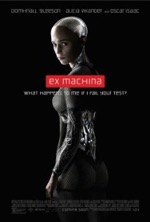Ex Machina (R)
03/05/15 00:41 Filed in: 2015

Starring: Alicia Vikander
April 2015
This review was originally tweeted in Real-time from the back row of a movie theater and appears @BackRoweReviews. Though efforts were made to tease rather than ruin this movie’s memorable lines and moments, some spoilers may exist in the following evaluation. The original tweets appear in black, while follow-up comments appear in red. For concerns over objectionable content, please first refer to one of the many parental movie guide websites. All ratings are based on a four star system. Happy reading!

Not quite. But certainly a unique entry into the genre.
First prize. #InstantCelebrity
Nothing new here…everyone wants a piece of success.
“Follow the river.” In which direction?
Pretty vague directions when dropping someone off in the middle of the wilderness.
Key card photo. Can I get a retake?
Remember that frightened look. You’ll see it again at the end of the film.
Gorgeous view from the patio. I can almost smell the pine trees.
The lab is situated in a remote region of a forest. Not only is the compound isolated, its tight, spare and windowless interiors lend it an institutional feel. Good thing Caleb doesn’t have claustrophobia.
Nathan wants Caleb to get past the “freaked out” stage.
Caleb should listen to his anxiety.
Data audit? Don’t sign the contract Caleb.
Of course, if he withholds his signature we don’t have a movie.
The Turing Test. Baptism of fire.
“Who’s Turing?” you ask. Reference The Imitation Game (2014).
Hello Ava!
Say it like “Hello Nurse!”
How many computer nerds wouldn’t get a #Ghostbusters reference?
Especially since Caleb holds his own during the Trek talk later in the movie. I chalk this up as a nitpick.
Ava turns the tables on Caleb, grills him with questions. Be careful, Caleb. Nathan is listening.
Also, learn from this incident. If she can turn the tables on you once…
“You shouldn’t trust anything he says.” Now we have a story.
Of course, everyone in the audience knows Nathan is full of it even before Caleb conducts his first session with Ava, so not much of a surprise.
Hacking the world’s cell phones. A map of how people think. Fascinating!
And frightening!
If you could go anywhere in the world, where would it be? Ava chooses a traffic intersection. #PeopleWatching
You’d find Data hanging out on the other side of the intersection, except he’d be engaged in small talk with passersby (TNG’s “Starship Mine”).
Ava plays dress up for Caleb. She looks kinda #PlainJane now.
Darn it! No more “curve” appeal.
“Engage intellect.” The discussion on #JacksonPollock and #StarTrek is intriguing.
Nathan’s Pollock painting does look like something Data would hang in his quarters.
Ava asks some tough questions for an AI.
Be very wary, young Caleb.
“Ava’s body’s a good one.” Uh, yeah!
The understatement of the year.
Caleb finds the skeletons in Nathan’s closet. #Sexbots
Hopefully there aren’t any minors in the audience since this is a Rated R movie (the fact that I’m bring this up reveals my distrust of parental “wisdom” in bringing younger kids to see such films), but just as a precaution: #FullFrontal.
Ava gives herself a physical upgrade. Thank God she put all the right parts in the right places.
Final analysis: an intriguing premise that asks some important questions about the essence of existence.
Rating: 3 out of 4. The Shakespearean ending is a miss, but the rest is a salient examination of sentience.
Deus ex machina is a Latin term that means “god from the machine.” The technique, which introduces a new character at the end of a story that swoops in and miraculously solves all of the problems, was employed by playwrights during Greek theater’s nascent period. Over time, the writing device fell out of favor and is now considered a universal no-no. In the new movie, which tellingly leaves out the deus (god) part of the title, we find a twist on the much impugned story device—we know who the agent of change is early on in the story, but how that character plays into the film’s climactic events is very much in question until the very end. The story here isn’t earth-shattering: A wealthy tech mogul lures a bright young computer nerd (under false pretenses) into conducting a Turing test on his latest android, who just happens to look like a supermodel. What works here is the examination—through the eyes of a machine—of what it means to be human. The mental chess match between Ava (Alicia Vikander) and Caleb (Domhnall Gleeson) is intriguing, and some complex emotional and psychological subjects are broached, such as: friendship, trust, sexuality and, of course, the essence of sentience. Another successful aspect of the film is its skillful thematic layering: the juxtapositions between the open spaces of the surrounding forest and the cloistered confines of the sterile lab, biological and mechanical beings and even good and bad people are all expertly woven into the movie’s narrative tapestry. The isolation from civilization and claustrophobia inside the compound both serve to enhance the film’s melancholic mood and are symbolic of how each of the characters is, in his/its own way, physically or mentally trapped. Lots of food for thought here, which makes the movie a joy watch. The small cast also suits the static, minimalist story. Each of the performers does fine work, but the lack of star power here (Oscar Isaac isn’t quite a household name yet, but will be come December) is one of the movie’s only drawbacks. The main problem with the film is its ending, which squanders a promising premise and solid setup with a predictable, even telegraphed, resolution that’s right out of Macbeth. In the end, Ex Machina is a stylish, thought provoking sci-fi yarn that should stand the test of time—well, at least until the androids take over and eradicate any trace of human existence.